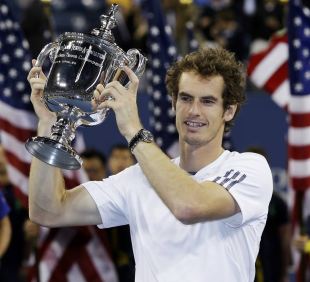
It is a question that has always plagued leading sportsmen: once they have achieved their dreams, where do they go from there? What is left to be fulfilled? Andy Murray must now confront that dilemma following his breakthrough triumph at the US Open against Novak Djokovic.
Having lost his previous four grand-slam finals, the fire in Murray must have raged as he sought to swerve another heartbreak. As much as anything, it was his burning desire to win that hauled him over the line.
In the wake of his triumph, he found himself a man in high demand, delivering an avalanche of words to the media. Inevitably, drained by a raft of interviews, he let his guard down and the odd injudicious comment followed.
There was one in particular that stood out: "If I were to stop playing tennis now and retire, I'd be very happy, but five more years at the top of the game is what I will try to do, if I can stay healthy, look after my body."
It was a remark that fuels the stereotype of the sporting Brit as diffident and lacking in ruthlessness - a myth which, it must be said, has been exploded this summer by, among others, the Olympians and Paralympians.
Let's get one thing straight: Murray's achievement in winning the US Open, and becoming the first British man to take a slam since 1936, is a phenomenal and fully deserved one. But he cannot be "very happy" to claim just one major - he is far too good for that.
The greats - Roger Federer and Tiger Woods, for instance - did not see their hunger diminish on receipt of a coveted prize. In fact, quite the opposite: they lusted after a repeat. Even Rory McIlroy, two years Murray's junior, acknowledged his work was far from done when he took the US Open title in 2011.
Perhaps Murray, who seems the sort to tie himself in knots via overthinking, is not quite on the same page as things stand: "I spoke to Ivan [Lendl, his coach] a couple of times during the year and he said, 'What worries you?' I said to him at the French Open this year, 'I worry what might happen if I win a major, how my life might change, because I want it to be the same'. I didn't really want it to change," he said.
He would be doing himself a disservice if he did not commit to getting at least a couple more slams on his CV. The opportunity is there, with doubts over Rafael Nadal's fitness and Federer's battle with Father Time. Murray's quest for a second, or third, or sixth major should be as frenzied as it was for his first. Too many world-class players - Pat Cash, Andy Roddick, Goran Ivanisevic - stopped at just one, and despite that success, they must contemplate what could have been.
Murray is a player who has the tendency to suffer if he gives undue attention to outside factors: there were reports of upheaval in his personal life when he foundered in the midsection of 2011. That being so, if he is not fully focused then his game will suffer - and "I will try to stay at the top" perhaps betrays the first warning signs of a drift in concentration.
Lendl, who also lost his first four grand slam finals but went on to win eight, must sit his charge down and tell him he owes it to himself to take the opportunity, undoubtedly open to him, to become a multiple major champion.

